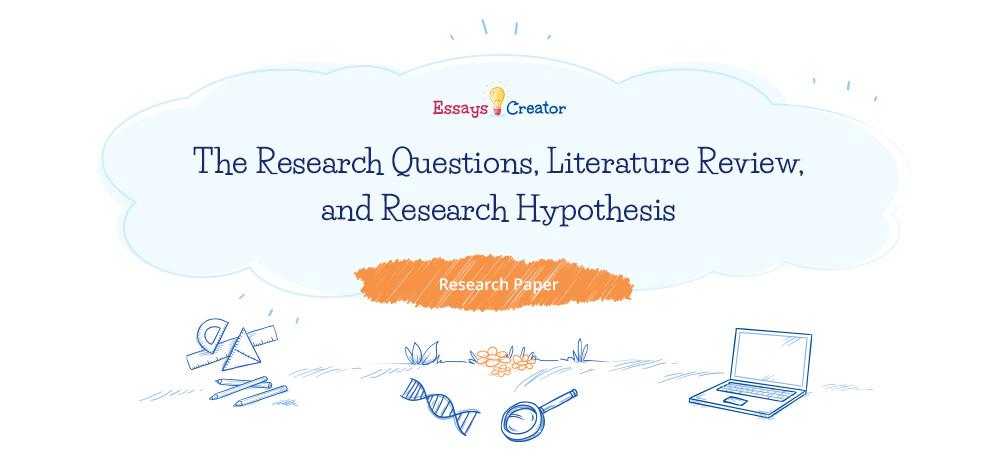
The Research Questions, Literature Review, and Research Hypothesis Free Essay
Outline
- Introduction
- Discussion
- Conclusions
The Research Questions, Literature Review, and Research Hypothesis
Every research is a complex process. It requires self-motivation and a lot of time management and organization skills from the side of the researcher (Newton, Bower & Williams, 2004; Blazer, 2007). Planning research starts with the purpose and the research questions. The whole process of creating a relevant and adequate research question is outlined as the process of “devising and revising a research question, commencing with an initial idea and focusing this into a testable research question” (Newton et al., 2004, p. 605).
Order your Research Paper help today!
However, research questions can be different, and this difference creates a lot of discussion in terms of their quality and the ability to lead the research to relevant results and findings. To conduct research that is timely, credible, and reliable, the research questions need to be “right” questions.
There are several criteria mentioned by Blazer (2007) which help define the scope of the research question. Newton et al. (2004) also mention that the size of the target population needs to be tested at this stage. This is an important issue, as the research needs to be conducted at the required level of depth within the time frame set for the research. If this does not correspond to the research questions, or if the target population happens to be larger, it usually requires extensive data analysis. In such cases, either research is not reliable in terms of the results or it simply requires more time and resources.
Medical issues are tested for relevance and feasibility before making research (Chien et al. 2006). Most social sciences are based on several descriptive research questions that are more popular among researchers than comparative research questions. However, various hypotheses which focus on more than one concept usually require comparative research questions (Newton et al., 2004).
Descriptive questions are popular due to their ability to uncover new areas of research. As Newton et al. (2004) imply, “any new area of investigation must start with the description of phenomena.” (p. 605). Medical science usually explores a lot of new processes, diseases, and effects of medical treatment, which can be part of the new phenomena. That is why descriptive research questions are so popular in this field.
Questions of relationship, on the contrary, address two concepts and their correlation. Such research questions aim at finding the linkage between the phenomena. Research questions about relationships are popular in cases when the existing phenomena are explored as similar, and the links between them are explored.
Questions of comparison as noted by Newton et al. (2004) are used when two or more concepts have to be contrasted. In such cases, two separate processes of research are compared to find their differences and similarities. In medical science, questions of comparison are used when the types of treatment or the types and forms of diseases are paralleled, and the research aims to either find similar or different features within these phenomena.
Blazer (2007) suggests that each research starts with a careful examination of the existing research findings. This is done to explore the question in detail and to discover the key concepts of the issue. When these concepts are found, the research gap is observed which is the core finding and the core topic of each research.
However, it is difficult to establish the connection of the issue to the past research. In many cases, researchers have to stop their literature review as they are unable to find extensive prior research on the anticipated research topic. Newton et al. (2004) believe that this can be avoided by being critical of each concept found during the process of the literature review. In such a case, the research gap is determined appropriately.
To access past research findings, the researcher has to address the quality of the previous research with care. This analysis should be done at a deeper level and with an understanding of the desired outcome of the analysis. Such factors as the quality of the previous research as well as the relevance to the research objective should be addressed. To address the quality of the past research findings, as Newton et al. (2004) proposes, the articles should be read with a critical viewpoint and with taking into consideration the following criteria: sampling, measures, data analysis, and conclusions.
Past research can have varied sampling which already makes such research irrelevant to the proposed research. At the same time, research methods and the measurements applied can be different and in some cases due to their sensitivity do not fully answer the research question. Finally, conclusions are important due to their relevance to the research question and research hypothesis. Each article should be reviewed in terms of the research hypothesis, and how the findings of the past research help to answer the research question of the initial research.
In some cases, research questions are formulated after the literature review. This is the most common consequence of the process, as scholarly literature helps to identify the core concepts of the research topic and see the research gap. Once the research gap is found, research questions are very easy to formulate.
Chien et al. (2006) observe that research questions are a result of the previous research literature. Newton et al. (2004) also suggest that “it is important to take time to frame the research question carefully, drawing on the experiences of other researchers.” (p. 608). Looking at past research provides a lot of useful information about the process of sampling and gives hints to the researcher about the research methods and data analysis that is relevant to this field of research. Such thinking is useful to ensure that the research conducted corresponds to the initial topic and fully addresses the research questions.

